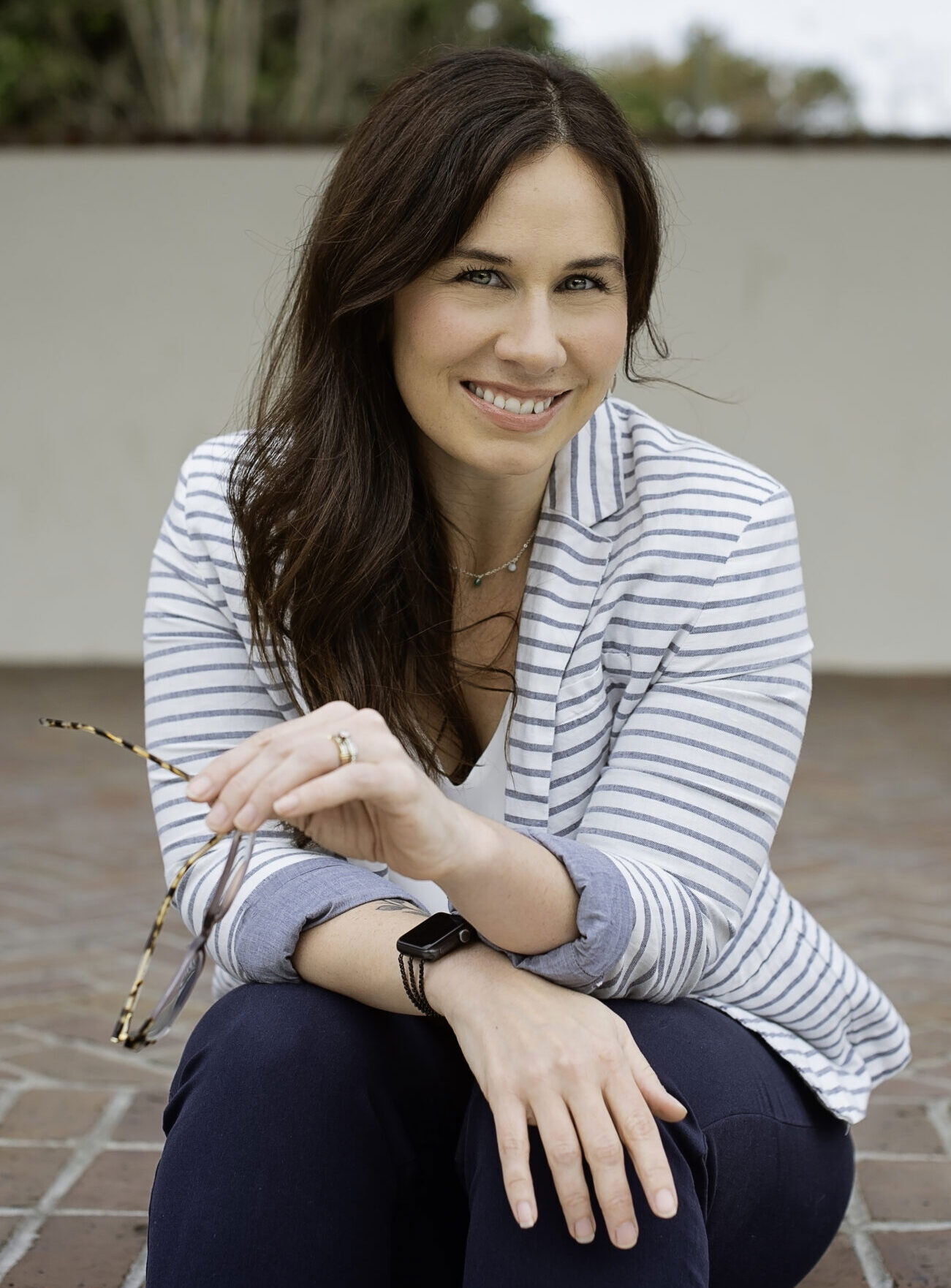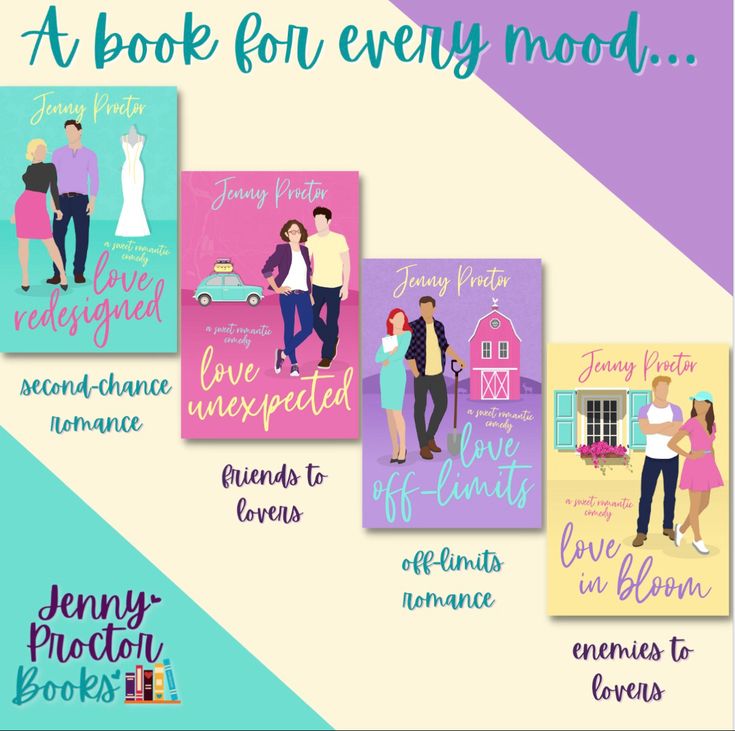An Exclusive Chat with Jenny Proctor: From Blogging Mom to Bestselling Author

Jenny Proctor’s journey from a busy mom with four young kids to a celebrated author is inspiring. What began as a simple blog chronicling her adventures in motherhood soon blossomed into a thriving writing career, proving that passion and perseverance can transform the most unexpected beginnings into extraordinary accomplishments. With a knack for creating relatable characters, engaging plots, and a perfect balance of humour and heartfelt moments, Jenny has become a favourite among readers.
In this exclusive interview, she takes us through the pivotal moments of her writing journey, from her first novel to her transition into indie publishing romantic comedies. She shares insights into her creative process, the art of crafting memorable characters and settings, and how real-life experiences subtly weave into her fictional worlds. Whether you’re an aspiring writer, a devoted reader of her works, or someone looking for inspiration, this conversation is packed with wisdom and warmth that’s sure to leave an impression.
1. Could you please share with us how your writing journey began? Was there a specific moment that inspired you to pursue writing? Tell us about your first published book. What was the journey like?
J. I started writing almost fifteen years ago. I’d never thought about writing fiction, but I had four young kids at home, so I started a blog, writing about my kids and what it was like to be a busy mom. I started gaining a following of blog readers who I didn’t know, and this felt so funny to me. But then people started to tell me I was a good writer, so I thought, “Maybe I should see if this is something I can do!” I took an online creative writing class, and I fell in love with writing fiction. Over the next nine months, I wrote my first novel and then submitted it to a small press that allowed direct submissions. Believe it or not, they picked it up and that started my publishing journey. I wrote four novels with the same publishing house before shifting gears and writing an indie-publishing romantic comedy.
2. Many of your books feature such relatable and engaging characters. How do you approach character development, and do any of your characters hold a special place in your heart?
J. I try really hard to write characters who feel like real people. This means they can’t always be perfect, but if they mess up or jump to conclusions or build walls to protect themselves, I try to give them a backstory that justifies why they do what they do. It’s all about motivation for me, making sure characters have a reason for every word and action. As far as a character who is special to me, I’d probably say Felix from my Absolutely Not in Love. He’s the most like my husband of all the heroes I’ve written!
3. The How to Kiss a Hawthorne Brother series has been incredibly well received. I’ve read ‘How to Kiss Your Best Friend’ and ‘How to Kiss Your Grumpy Boss’ and loved them! I adored every character in both books. Could you share some insights into your creative process for this series? Where did the inspiration come from?
J. It’s actually funny because the idea for the Hawthorne brothers came to me by accident! I wrote a story for the brothers’ sister Olivia first and while I was drafting, I was trying to come up with something Olivia could tell her date that might intimidate him. So I thought, she could have a bunch of brothers! As I wrote them, I realized I absolutely had to write books for all of them. It was so fun bringing the entire family to life!
4. Your readers appreciate the balance you strike between humour and heartfelt moments. How do you find that sweet spot in your writing?
J. First, THANK YOU. It means a lot that you think I do this well because it’s really what I strive for. I wish I could tell you HOW I do it, but this is one of those things that I just sort of intuitively feel. I listen to my gut. Read things back and look for stuff that might push into being cheesy or too sappy. I think balancing the more emotional moments with humor is a good way to push the feelings without crossing over into sentimentality.
5. The romantic tension in your stories is beautifully crafted. What makes for a compelling romance in fiction, and how do you approach writing it?
J. Writing that romantic tension is so much fun! The small touches, the looks, the small gestures that say “I see you.” But all of those small things won’t add up to much if readers don’t already care about the characters, so I try first to create people readers want to root for, then I put them in every situation I possibly can where they might have to touch or talk or face their feelings.
6. Family and friendship seem to play significant roles in your stories. Why are these themes important to you, and how do you hope they resonate with your readers?
J. At the risk of sounding like a broken record that just keeps repeating the same thing over and over, this is one of those things that makes people feel REAL. None of us live in a bubble. There are people in our lives who love us and care about us, so I think it’s important in a novel for characters to have lives outside of their love interest. Friends and/or family members can be very useful tools in helping main characters figure out their problems and their hearts. But secondary characters need to feel like real people too, people with personalities and jobs and lives.
7. Writing dialogue that feels natural and witty is a talent. How do you approach writing dialogue, and what’s the secret to making it flow so effortlessly?
J. Writing dialogue that doesn’t feel stilted can definitely be tricky! I think part of it is intuition, but there is a larger part that can be taught and practised. I always recommend that beginner writers read the dialogue they’ve written out loud. Often, we can HEAR things that sound unnatural more than we can think them when we’re reading inside our head. You could even go one step further and have two other people read your dialogue between characters. This is a great way to pick up on the parts that might feel unnatural. A key thing to remember: dialogue must serve your characters before it serves YOU as the author. It’s tempting to use dialogue to communicate story information to your readers, and it can definitely be used for this, but only if it’s something your characters would actually say to each other if readers weren’t “listening in.”
8. How do you handle the challenges of writer’s block or moments of doubt during the writing process?
J. It’s an unfortunate part of the process, but I’ve learned not to stress about it when it happens. Usually, if I take a walk or read something wonderful or just rest my brain for a bit, inspiration will strike again. Pretty much every single book, I have a moment where I think, I can’t do this job anymore! But it always passes and I always finish, so I’ve learned to embrace the journey and keep pushing forward!
9. Readers connect deeply with the emotional arcs in your stories. How do you channel real-life emotions and experiences into your writing while maintaining a fictional narrative?
J. People often ask me if I base my stories on my real life. My answer is that I’ve never done it intentionally, but I’m sure there are pieces of ME and my experiences in every single story. I just try to write from my heart and hope that some part of what I create will resonate with others.
10. If you could spend a day with any of your characters, who would it be and why?
J. I think it would be really fun to hang out with Hannah Hawthorne, who is the mom of the Hawthorne brothers. She seems so wise and grounded. I think it would be fun to hang out with her, help her make some goat's milk soap and love on her baby goats!
11. Your books often feature unique and memorable settings. How important is setting in your stories, and how do you bring these places to life?
J. I love the setting! I generally write about places I already know and love so that I can use my own observations and experiences to colour how I depict a place in a story. Western North Carolina in the Eastern US is home to me, so it’s featured more than anywhere else simply because I love it so much!
12. As an author, you’ve likely grown and evolved with time. What advice would you give to your younger writing self if you could?
J. Stop using so many ellipses! And also, be gentle with yourself. It can be tough to grow in public but don’t stop breathing. Nothing has to be perfect. Just try to make each book a little better than the last.
13. What do you like to do when you’re not writing?
J. I love to hike and spend time with my dog, and I love watching movies and reading good books.
14. How do you maintain a connection with your readers, and how does their feedback impact your work?
J. I love interacting with readers and fans in my Facebook group and through my newsletter. I don’t frequently ask for feedback directly from readers, but I will sometimes read my negative reviews (I know…this is crazy!) just to see if there are things I can work on for the next book. I have a pretty thick skin so I don’t recommend doing this generally, but if you’re in the right frame of mind, it can be both educational and helpful.
15. Do any of the characters or scenes in your books draw inspiration from real-life experiences or people?
J. I think I already touched on this one, so I’ll just say I never base characters on people I know in real life. I frequently use places that are real, and I’ve occasionally used phrases or funny stories that are influenced by my own life. But it’s never something huge. Just small things!
16. What do you find to be the most rewarding part of being an author? Is there a particular moment or feedback from a reader that has stood out?
J. I love hearing from readers. It’s definitely the best part. Knowing my books have given someone a bright spot of joy or happiness means so much.
17. How do you balance your writing schedule with your personal life? Do you follow any particular routines or methods to stay organized and inspired?
J. This is honestly one of the hardest parts of being an author! I have my stories in my brain all the time, and since my writing income is currently providing for my family, it’s easy to feel like I have to always be working, trying to do a little more or write a little more. I try to keep my writing time to regular work hours. When the workday is over, I walk away and just try to be present with my people. I’ve generally found that I work BETTER when my personal and work lives are in balance.
18. Do you read your book reviews? How do you deal with bad or good ones?
J. I do! Not always, but when I’m trying to get a sense of how books landed with readers, I’ll look them over. I’m pretty good at letting the bad ones roll off but timing really matters! I’m not always in the frame of mind to read them.
19. Are there any new projects or upcoming books you’re excited to share with your readers? Please provide information about the books you have published as well.
J. Right now, I’m working on my next hockey book, When Alec Met Evie. I’m having so much fun with it and am excited to release it after the new year.
20. Lastly, share some advice for aspiring authors.
J. Don’t ever stop working on your craft. There is always some way you can push yourself to get better, to elevate how and what you write. It’s easy to get sucked into the marketing side of being an author, and while selling the books you’ve already written is important, it should never be more important than writing something new. The best way to improve is to just keep writing. Build a body of work, trying with each novel to learn and implement something new.
As we conclude our conversation with Jenny, it’s clear that her success as an author isn’t just a product of talent but of a genuine love for storytelling and an unwavering commitment to her craft. From the humble beginnings of a blog to now captivating readers with her engaging romantic comedies, Jenny's journey is a testament to the power of pursuing what you love, no matter how unconventional the path may seem. Her ability to craft complex, relatable characters and infuse her stories with humour and emotional depth makes her work stand out, resonating with readers on a deeply personal level.
Her advice to aspiring writers—focusing on the craft and allowing your stories to grow organically—reminds us that writing is a journey, not a destination. The balance she strikes between her personal and professional life and her willingness to stay open to feedback and growth demonstrate the humility and perseverance needed to thrive in this industry.
We are excited to see where Jenny’s writing journey takes her next and her forthcoming projects are sure to bring more of the joy, warmth, and relatability that her readers have come to love. Thank you, Jenny, for sharing your story with us today. We look forward to experiencing many more of your heartfelt tales in the future.
I would like to thank you again for sharing your valuable insights and for taking the time to participate in this enlightening exchange. Thank you for allowing me to be a part of your journey and I look forward to seeing your work will enrich the literary world.
Connect With Author Jenny Proctor:
Instagram: https://www.instagram.com/p/C8KTRlTgX5U/?img_index=1
Facebook: https://www.facebook.com/jennyproctorbooks
Website: https://jennyproctor.com/
Click here for the review of "How To Kiss Your Best Friend"
Click here for the review of "How To Kiss Your Grumpy Boss"







